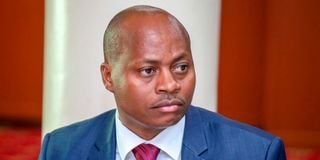Premium
Health officials trade blame over mosquito nets scandal at Kemsa

Acting Kenya Medical Supplies Authority Chief Executive Andrew Mulwa when he appeared before the National Assembly’s Health Committee on June 20, 2023.
Blame games and finger-pointing have characterised the ongoing probe into the mosquito nets scandal.
During a Senate Committee on Health sitting chaired by Mr Jackson Mandago (Uasin Gishu) yesterday, acting Kenya Medical Supplies Authority (Kemsa) CEO Andrew Mulwa and acting Deputy Director of Medical Services Ahmeddin Omar were questioned on their involvement in the procurement process.
Dr Mulwa was previously the acting director of medical services at the ministry and was Dr Omar’s supervisor who was then the head of the national malaria programme. During their submissions, they presented documents showing their involvement in the procurement process, including memos with their signatures.
However, the committee heard that there was a discrepancy between their submissions and those of the former Public Health and Professional Standards Principal Secretary Josephine Mburu.
Dr Omar, who had been subtly mentioned during the grilling of the new Kemsa boss in Parliament last week, told the senators that he reported only to Dr Mulwa and that all his communications went through him.
However, when Dr Mburu was questioned, she presented the committee with a letter indicating that she had received a memo from Dr Omar, who has denied ever communicating directly with the former PS.
"I only communicate with my boss and I never sent a memo to the permanent secretary. I had a physical meeting with Dr Mulwa where we agreed that I would write a letter to him regarding the omission of key specifications of the bed nets," Dr Omar told the committee.
The two officials also said that they only found out about the controversial omission through a newspaper advertisement and raised the alarm about the missing specification of the mosquito nets, called piperonyl butoxide (PBO), after which Dr Mulwa wrote a memo to the PS.
The memos appear to have been one-sided, as feedback rarely reached Dr Mulwa's desk.
Senator Esther Okenyuri asked if Dr Mulwa ever followed up to get feedback.
"We did not get any feedback ... If something bypassed me and went straight to my boss, the former PS, I couldn't question it because she was the boss. In retrospect, I think I should have asked her," said Dr Mulwa. He said he later learned that Kemsa and the other stakeholders had agreed on a different specification for the bed nets and that the omission had not been corrected.
Dr Mulwa had told the committee that it was not up to the ministry to decide on the type of nets to be procured, but that the decision rested with the donors.
"But shouldn't the ministry give the right position and advice?" asked Senator Mandago.
"We only specify the number of nets we want and then the Global Fund and Treasury decide on the type of nets to be procured, depending on the availability of funds. They have experienced specialists who advise them on different types of medical equipment," said Dr Mulwa.
Senator Okenyuri and Senator Hamida Kibwana were concerned that there had been meetings between the PS, Dr Mulwa and some of Dr Omar, but that most were undocumented.
“It is painful that our country is in danger because of the scandals at Kemsa. This will have an impact on our programmes and their implementation,” he said.




